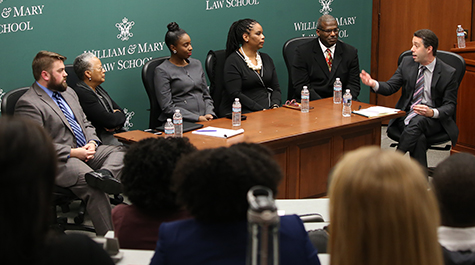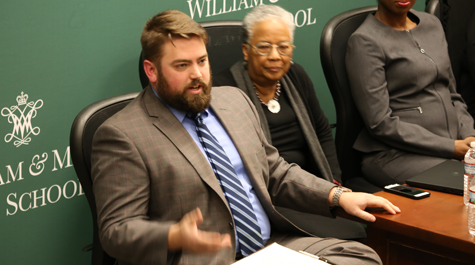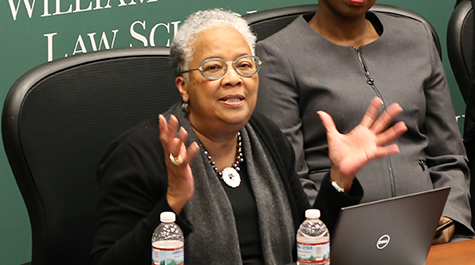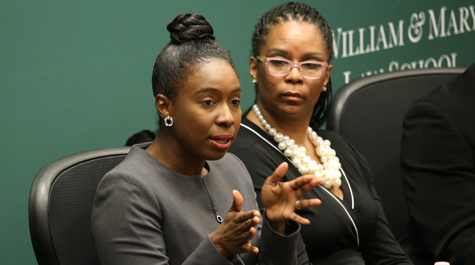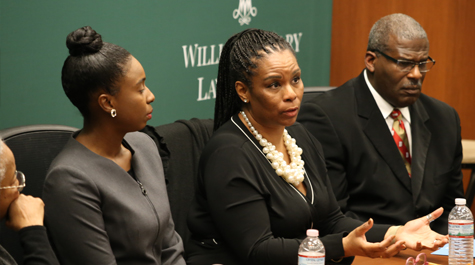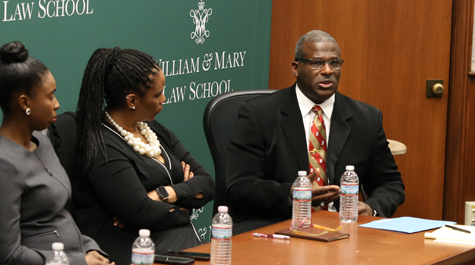BLSA’s Annual Symposium Examines the Technological Impact of Police Brutality
On February 23, William & Mary’s Black Law Students Association (BLSA) held its annual symposium on Race and the Law. The theme this year was “The Technological Impact of Police Brutality: The Then, The What, The Now What.”
Adam Gershowitz, Associate Dean for Research and Faculty Development and Professor of Law at William & Mary, moderated the event, promising “a varied set of experiences from defenders to prosecutors to police officers to folks who work in the system as well as write about it.”
And the panelists more than delivered.
The first hour saw the experts discuss their experiences and offer professional opinions regarding body cameras, social media and other advances that have impacted the problem of police brutality.
Dave Anderson, the Assistant Public Defender in the city of Hampton, Va., opened with several examples of how body cameras can be limited in getting to the truth. He concluded by noting that public defenders like himself aren’t necessarily given access to body camera video as a matter of course if they file a formal motion of discovery.
“There have been some reforms, and they’re going to take place in the future where all jurisdictions are essentially going to go to what we call ‘open file discovery,’ where we at least get to inspect [evidence] and review [video],” Anderson said. “Long story short, it’s changing, but it’s not changing fast enough, and it only works if we have access to it.”
Professor Mildred Robinson, the Henry and Grace Doherty Charitable Professor of Law at the University of Virginia, then considered police brutality from a tax perspective, citing Ferguson, Mo., as an example. (Ferguson is the suburb of St. Louis where police officer Darren Wilson fatally shot Michael Brown Jr., an unarmed African-American teenager, in August 2014.)
Robinson said that the need for public revenue during the recession forced Ferguson police to aggressively raise money through increased citations and fines.
“Clearly, finances can drive police behavior, which might culminate in a worst case scenario on the margins,” Robinson said. “I suspect if we were to follow that trail long enough, we find that there were other places of which the same thing could be said.”
Robinson hoped that by looking at the tax system, perhaps experts “can learn to least curb some of the sins [of police brutality], if not make the underlying behavior in the worst cases actually go away.”
William & Mary Law alumna Stephanie Morales J.D. ’09, the elected Commonwealth’s Attorney for Portsmouth, Va., hoped to see everybody demanding accountability, not only of each other but of themselves as prosecutors.
“We have to be accountable that we’re paying attention to what’s on these body cam videos and that we’re providing exculpatory information, that we’re not only turning it over and expecting the defense to do something, but that we step up and actually provide a service to the people who have been wronged,” Morales said. “As a community we don’t want to turn a blind eye and say, ‘Okay, now my city has body cams, so everything is great.’ Really, we all just have to pay attention to what’s going on and be accountable for making sure that we try to get this right.”
Laura Shepherd, who joined William & Mary Law School as Associate Dean for Student Services in August 2018, shared her experiences as a former prosecutor in New York City. Although well aware of the benefits of technology, she considers the implementation of body cams just a band-aid solution.
“What police forces are not doing enough of is actually getting to the root of the problem,” Shepherd said. “We still have some huge issues to resolve, and they’re not unique to the police department; they’re endemic of our society, and they stem from a perception and unconscious bias that the people in our country have around people of color.”
Milton Franklin, Police Chief at Bridgewater College in Bridgewater, Va., then reminded the audience that not every police department has expensive camcorders and technology that can mitigate bad behavior on the part of law enforcement.
“The problem with bystander cameras and video footage is that they only show a small portion of what happened, usually the end of a bad incident, a death or murder,” Franklin said. “It doesn't show what happened before the police officer got there; it doesn’t show the first interaction of the police officer.”
Franklin ended by saying that body cameras are only as good and as effective as the officer or the operator using the technology. “If [operators] are failing to use technology according to the policy you’re not going to hear of it; it is an internal issue.”
Professor Gershowitz then moderated a lively question-and-answer session with students asking tough questions and following up on earlier comments.
Response to the event was particularly favorable.
“The panelists at this year’s symposium provided the audience with each of their own professional experiences on how body cameras and other technological advances impact police brutality and police behavior generally,” said Briana Jackson ’20, who coordinated the symposium. “It was most interesting to hear from the panelists that in order to help combat police brutality, in part, society must demand justice and hold our elected officials, prosecutors and police officers accountable for their actions or lack thereof.”
“I enjoyed hearing the experiences of all the panelists,” said Mechelle A. King ’21, “but I found Professor Robinson's tax perspective particularly insightful because she painted a picture of what happens when municipalities try to fill budget shortfalls through citations, showing that the events in Ferguson, for example, were a consequence of what happens when financial pressure is applied to police forces.”
At William & Mary, the W.C. Jefferson Chapter of BLSA serves as an academic and social resource for law students, while also providing professional development and networking opportunities to prepare students for a long and successful career in law.
Previous BLSA-sponsored symposiums on Race and the Law include: “Where Do We Go From Here: Community or Chaos? A Conversation on Race, Law, and Current Events” (2015), “Systematic Suppression: Mass Incarceration and Voter Disenfranchisement” (2016), “The Influence of Implicit Racial Bias in Society and Criminal Justice” (2017) and “Health Access and Outcomes for Minority Populations: Intersecting Issues in Health, Race, and Law” (2018).
About William & Mary Law School
Thomas Jefferson founded William & Mary Law School in 1779 to train leaders for the new nation. Now in its third century, America's oldest law school continues its historic mission of educating citizen lawyers who are prepared both to lead and to serve.
